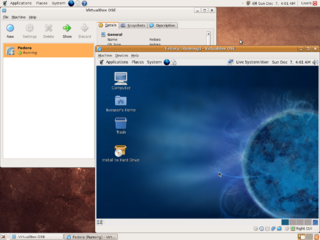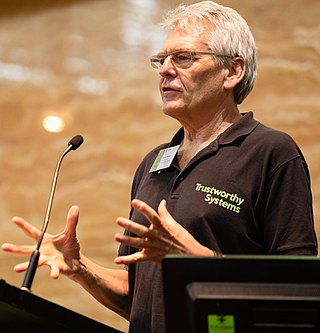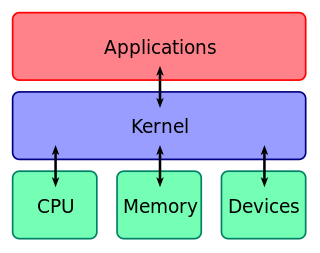Related Research Articles

In computing, a virtual machine (VM) is the virtualization or emulation of a computer system. Virtual machines are based on computer architectures and provide the functionality of a physical computer. Their implementations may involve specialized hardware, software, or a combination of the two. Virtual machines differ and are organized by their function, shown here:

Exokernel is an operating system kernel developed by the MIT Parallel and Distributed Operating Systems group, and also a class of similar operating systems.
Checkpointing is a technique that provides fault tolerance for computing systems. It involves saving a snapshot of an application's state, so that it can restart from that point in case of failure. This is particularly important for long-running applications that are executed in failure-prone computing systems.
In computer science, a single address space operating system is an operating system that provides only one globally shared address space for all processes. In a single address space operating system, numerically identical logical addresses in different processes all refer to exactly the same byte of data.
Özalp Babaoğlu, is a Turkish computer scientist. He is currently professor of computer science at the University of Bologna, Italy. He received a Ph.D. in 1981 from the University of California at Berkeley. He is the recipient of 1982 Sakrison Memorial Award, 1989 UNIX InternationalRecognition Award and 1993 USENIX AssociationLifetime Achievement Award for his contributions to the UNIX system community and to Open Industry Standards. Before moving to Bologna in 1988, Babaoğlu was an associate professor in the Department of Computer Science at Cornell University. He has participated in several European research projects in distributed computing and complex systems. Babaoğlu is an ACM Fellow and has served as a resident fellow of the Institute of Advanced Studies at the University of Bologna and on the editorial boards for ACM Transactions on Computer Systems, ACM Transactions on Autonomous and Adaptive Systems and Springer-Verlag Distributed Computing.
In computer science, capability-based addressing is a scheme used by some computers to control access to memory as an efficient implementation of capability-based security. Under a capability-based addressing scheme, pointers are replaced by protected objects which specify both a location in memory, along with access rights which define the set of operations which can be carried out on the memory location. Capabilities can only be created or modified through the use of privileged instructions which may be executed only by either the kernel or some other privileged process authorised to do so. Thus, a kernel can limit application code and other subsystems access to the minimum necessary portions of memory, without the need to use separate address spaces and therefore require a context switch when an access occurs.

Gernot Heiser is a Scientia Professor and the John Lions Chair for operating systems at UNSW Sydney, where he leads the Trustworthy Systems group (TS).
The SHARE Operating System (SOS) is an operating system introduced in 1959 by the SHARE user group. It is an improvement on the General Motors GM-NAA I/O operating system, the first operating system for the IBM 704. The main objective was to improve the sharing of programs.
Michael Burrows, FRS is a British computer scientist and the creator of the Burrows–Wheeler transform, currently working for Google. Born in Britain, as of 2018 he lives in the United States, although he remains a British citizen.

Alexander G. Fraser, also known as A. G. Fraser and Sandy Fraser, was a noted British-American computer scientist and the former Chief Scientist of AT&T.

The kernel is a computer program at the core of a computer's operating system and generally has complete control over everything in the system. The kernel is also responsible for preventing and mitigating conflicts between different processes. It is the portion of the operating system code that is always resident in memory and facilitates interactions between hardware and software components. A full kernel controls all hardware resources via device drivers, arbitrates conflicts between processes concerning such resources, and optimizes the utilization of common resources e.g. CPU & cache usage, file systems, and network sockets. On most systems, the kernel is one of the first programs loaded on startup. It handles the rest of startup as well as memory, peripherals, and input/output (I/O) requests from software, translating them into data-processing instructions for the central processing unit.
A distributed operating system is system software over a collection of independent software, networked, communicating, and physically separate computational nodes. They handle jobs which are serviced by multiple CPUs. Each individual node holds a specific software subset of the global aggregate operating system. Each subset is a composite of two distinct service provisioners. The first is a ubiquitous minimal kernel, or microkernel, that directly controls that node's hardware. Second is a higher-level collection of system management components that coordinate the node's individual and collaborative activities. These components abstract microkernel functions and support user applications.

Ion Stoica is a Romanian–American computer scientist specializing in distributed systems, cloud computing and computer networking. He is a professor of computer science at the University of California, Berkeley and co-director of AMPLab. He co-founded Conviva and Databricks with other original developers of Apache Spark.
Kai Li is a Chinese-American computer scientist and professor of Princeton University. He is noted for his work on Distributed Shared Memory (DSM) and co-founding the storage deduplication company Data Domain Inc. which was acquired by EMC Corporation in 2009.
EraMobile -Epidemic-based Reliable and Adaptive Multicast for Mobile ad hoc networks is a bio-inspired reliable multicast protocol targeting mission critical ad hoc networks. EraMobile supports group applications that require high reliability and low overhead with loose delivery time constraints. The protocol aims to deliver multicast data with maximum reliability and minimal network overhead under adverse network conditions. EraMobile adopts an epidemic-based approach, which uses gossip messages, to cope with dynamic topology changes due to the mobility of network nodes. EraMobile's epidemic mechanism does not require maintaining any tree- or mesh-like structure for multicast operation. It requires neither a global nor a partial view of the network, nor does it require information about neighboring nodes and group members. The lack of a central structure for multicast lowers the network overhead by eliminating redundant data transmissions. EraMobile contains a simple adaptivity mechanism which tunes the frequency of control packages based on the node density in the network. This adaptivity mechanism helps the delivery of data reliably in both sparse networks -in which network connectivity is prone to interruptions- and dense networks -in which congestion is likely because of shared wireless medium-.
Kenneth P. Birman is a professor in the Department of Computer Science at Cornell University. He currently holds the N. Rama Rao Chair in Computer Science.
Marinus Frans (Frans) Kaashoek is a Dutch computer scientist, entrepreneur, and Charles Piper Professor at the Massachusetts Institute of Technology.
iMAX 432 was an operating system developed by Intel for digital electronic computers based on the 1980s Intel iAPX 432 32-bit microprocessor. The term micromainframe was an Intel marketing designation describing the iAPX 432 processor's capabilities as being comparable to a mainframe. The iAPX 432 processor and the iMAX 432 operating system were incompatible with the x86 architecture commonly found in personal computers. iMAX 432 was implemented in a subset of the original (1980) version of the Ada, extended with runtime type checking and dynamic package creation.
Dawson R. Engler is an American computer scientist and an associate professor of computer science and electrical engineering at Stanford University.
Multitier programming is a programming paradigm for distributed software, which typically follows a multitier architecture, physically separating different functional aspects of the software into different tiers. Multitier programming allows functionalities that span multiple of such tiers to be developed in a single compilation unit using a single programming language. Without multitier programming, tiers are developed using different languages, e.g., JavaScript for the Web client, PHP for the Web server and SQL for the database. Multitier programming is often integrated into general-purpose languages by extending them with support for distribution.
References
- ↑ Elshoff, James L.; Ward, Mitchel R. (January 1976). "The MCTS operating system". ACM SIGOPS Operating Systems Review. 10 (1): 18–38. doi: 10.1145/775314.775317 .
- 1 2 Brown, R.R; Elshoff, J.L.; Ward, M.R. (1 Oct 1975). "The GM Multiple Console Time Sharing System". ACM SIGOPS Operating Systems Review. 9 (4): 7–17. doi:10.1145/775310.775311 . Retrieved July 1, 2024.
- ↑ Krull, pg. 54
